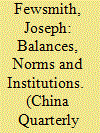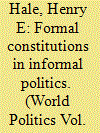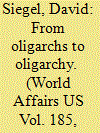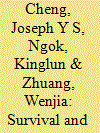|
|
|
Sort Order |
|
|
|
Items / Page
|
|
|
|
|
|
|
| Srl | Item |
| 1 |
ID:
181935


|
|
|
|
|
| Summary/Abstract |
In recent years, explanations of the Chinese Communist Party's longevity as a ruling party have focused on institutionalization. But a close look at the four leaders of China since 1978 reveal that institutions have remained weak. Of much greater importance have been balances that reflect the informal distribution of power and norms that express agreed-upon Party procedures. Of yet even greater importance have been the efforts of individual leaders to concentrate power in themselves through the appointment of protégés to critical positions. Such leaders also attempt to extend their influence beyond their terms in office through those protégés and their roles as “elders.” Thus, we see a tension between Party norms and the centralizing tendencies of Leninist systems in which the centralizing tendencies usually prevail. With Xi Jinping, we see a far greater personalization of power disrupting the norms and balances existing under previous leaders.
|
|
|
|
|
|
|
|
|
|
|
|
|
|
|
|
| 2 |
ID:
149365


|
|
|
|
|
| Summary/Abstract |
Why hasn’t the marked increase in women in politics over the last half century led to the expected results of increased gender equality and more democracy? In order to propose a new answer to this question, which is central for both theoretical and empirical feminist political science, I look at the case of Putin’s Russia as one of the authoritarian-leaning regimes that have promoted women into politics while simultaneously becoming more misogynist. Building on feminist institutionalism and the study of Russia’s regime dynamics, both of which are extending the study of informal institutions, I claim that women are being fast-tracked into politics informally, not just formally such as by party or legislative quotas. Yet these women are then boxed in by informal rules and by parallel institutions and posts, with virtually no opportunities to advocate for women’s interests. Putin’s regime has promoted women to be “stand ins” during times of crisis or change, “loyalists” and “showgirls” when the regime needs to showcase elections and representation, and “cleaners” when the appearance of corruption threatens the regime. Even demonstrations of ultimate loyalty have not protected those women who once advocated for feminist policies. This exercise in concept building suggests a framework for thinking about the importance and operation of informal institutions, sustained by gendered and homophobic rules, as a bulwark of male dominance that undermines women’s representation. There are also important policy implications, as advocates have been pushing for more women in politics to address a variety of ills that, my analysis suggests, will not be solved by numbers alone.
|
|
|
|
|
|
|
|
|
|
|
|
|
|
|
|
| 3 |
ID:
108024


|
|
|
| 4 |
ID:
186385


|
|
|
|
|
| Summary/Abstract |
Drawing heavily on theories about Russia's informal politics, American sanctions were designed to change Russian foreign policy by exploiting political conflict among oligarchs and the state elite; however, after nearly eight years of sanctions, Russian elites seem more united than ever. I propose that Russia's oligarchs—the ruthless self-interested economic elite in Russia's informal political system—might sometimes act as a cohesive oligarchy, particularly when their wealth is threatened from external rather than domestic sources, as has been the case under Western sanctions. Through an in-depth case study on the design and outcome of sanctions, this article seeks to develop a more dynamic theory of Russia's informal politics and explain the apparent cohesion among state and economic elites since 2014 as the result of a politics of wealth defense induced by Western sanctions.
|
|
|
|
|
|
|
|
|
|
|
|
|
|
|
|
| 5 |
ID:
183935


|
|
|
|
|
| Summary/Abstract |
While studies on local labor activism in Indonesia have blossomed in recent years, they rarely look at the role played by informal politics. Using a case study at the grassroots level in Makassar that focuses on industrial relations, we look to start filling this gap. We explore how labor activism in industrial situations, such as factory strikes and protests, has evolved under informal political circumstances. We find that these relations are dominant and highly significant for influencing labor activism at the local level. Moreover, we find the emergence of informal politics is mainly influenced by the fragmentation of labor unions, the personalism of labor leadership, and the pragmatism of union officials and workers. All of these tend to trigger informal political participation, such as brokerage, illegality, and kinship, that can overshadow local labor activism in factories. We conclude with a discussion of how the influence of informal politics has weakened labor activism at the local level and ways to distinguish the patterns, characteristics, and vulnerabilities of workers in industrial relations.
|
|
|
|
|
|
|
|
|
|
|
|
|
|
|
|
| 6 |
ID:
101015


|
|
|
|
|
| Publication |
2010.
|
| Summary/Abstract |
This article attempts to use three case studies of labor organizations to explain the uncertainty of informal politics in China. Because informal rules are naturally vague and uncertain, the tactical interactions between government agencies and civic groups become unbalanced. Uncertainty in informal politics in China is almost inevitable.
|
|
|
|
|
|
|
|
|
|
|
|
|
|
|
|
|
|
|
|
|